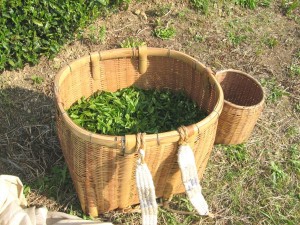By Danielle Rippingale
There is nothing more warming and soothing than a hot cuppa on a cold day. Japanese culture celebrates tea, and we are spoilt by the endless varieties and flavors of tea that are available in Japan from around the world. However because not all tea is created equal, it is useful to consider these points when purchasing your tea.
Tea has many health promoting properties, including Vitamins A, C, E and polyphenols. Green tea is abundant in a type of polyphenol called catechins, which were discovered in the 1970s by medical researchers wishing to understand why people in Japan’s major tea-growing area, Shizuoka Prefecture, had much lower rates of cancer than other Japanese.
Despite coming from the same plant, black tea has more caffeine than green tea, but is also rich in properties that are antibacterial, and lowers blood cholesterol and body fat. Herbal teas offer various benefits, are made with an infusion of flowers, bark, fruit or non-tea leaves, and contain no caffeine.
If you were to buy a conventionally farmed pear, you’d be sure to wash it off before eating it, but with tea, the first time you ‘wash’ the tea leaves is when you brew it to drink. Conventional teas are produced with the aid of synthetic chemicals (such as fertilizers and pesticides), and have a lasting effect on the surrounding ecosystem and the health of the farmers who cultivate
the land. You can find a range of organic teas at retailers like Natural House. CHOICE organic teas offer herbal and rooibos varieties (16 tea bags from ¥588, www.choiceorganicteas.com), whileYogi Tea offers therapeutic and delicious teas like Lemon Ginger and Throat Comfort (16 tea bags ¥950, www.yogiproducts.com).
Not only is organic farming safer for wildlife, it is also safer for workers. On conventional tea estates, farmers (including children) work without the protection of safety gear, spraying plants throughout the year with hazardous and toxic chemicals. They also toil long hours at low wages and have low health security. Fair Trade Certified tea guarantees fair wages and respectable living and working conditions.
Pukka specializes in organic and fairly traded herbal teas that offer unique therapeutic properties for wellness based on the ancient Indian science of ayurveda. With flavors like Three Ginger, Relax and Clarity, you’ll sip balance into your life in no time (20 bags ¥988, www.pukkaherbs.jp). Japan-based N-Harvest has strong commitments to organic and fair trade teas from India, Sri Lanka and Pakistan. Their beautifully packaged loose teas are available in various sizes and can be purchased online (www.nharvest.net) and soon at Natural House.
Coming from a long line of organic tea farmers in Shizuoka Prefecture, Ayumi Kinezuka is acutely aware of the challenges facing small artisan tea farmers today. The fall in the market price of tea, combined with the aging farmer population, forces many farmers to abandon their farmlands each year.
The Organic Tea Farmers Union has grown to 30 families over the past 34 years, and has created a way for farmers to exchange information, improve their skills and knowledge, and build supportive relationships with others.
Munouyakucha Nokai’s delicious teas come from the tea union to which Ayumi’s family belongs. She strongly believes that organic and direct marketing provide ways for farmers to survive and create a sustainable relationship with nature and society as a whole. To purchase, visit www.munouyakucha.com (Japanese only, however for service in English you can email Ayumi directly [email protected]).
At the base of Mt. Fuji lies the Earth Embassy, where you will find an organic farm, education center, café and guesthouse. Mount Fuji 100% non-certified organic mint tea is made from a bouquet of spearmint, white peppermint and apple mint. Mint tea aids digestion and alleviates nausea, headaches and congestion. Purchase Mt. Fuji Mint Tea (10 teabags ¥750) and learn more about Earth Embassy by visiting www.earthembassy.org.
Masala Chai for two
3 tsp each of: cinnamon, ginger, nutmeg, cardamon, cloves and Assam tea
100ml water
1 cup milk
Sugar (maple or white)
• Boil water in pot. Add the spices and tea (adjust to your liking). Stir and cook one minute.
• Add milk and cook over low heat for one to two minutes. Add sugar to your liking.
• Pour into cups using a tea strainer.
Eco Fact
The catechin Epigallocatechin gallate (EGCg) is only found in tea and is one of the most potent antioxidants known today.









